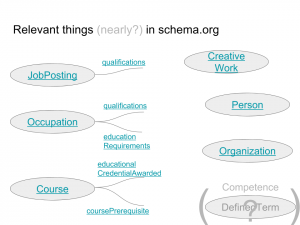Project kick off
We had a community group kick off call on Monday 27 November. This was well attended and allowed us to come to some initial agreements about the parameters for the projected work. The slides I used are available here (pdf) and on Google Slides, but they were just my initial thoughts, this summary takes on board the comments that were made during the meeting.
Aims and priorities
We had a good discussion about the aims and priorities of the group. We agreed that the wording currently used to define educational and occupational credentials needed to be softened a little, to be more explicit that some credentials might be granted without assessment, that not all learning is formal, and that organizations as well as individuals may be granted credentials. This would reflect both current practice with credentials such as OpenBadges, and the realities of what happens when terms are added to schema.org and picked up by its broad community of users. It also reflects the wider potential of the work that we are doing, which may be applicable beyond the education domain.
schema.org
I gave a brief overview of schema.org wanting to emphasize that it is not a precisely defined ontology with many finely distinguished specialist terms, but rather focuses on reuse of loosely constrained terms used a generally as makes sense. It can however be the basis for more specific vocabularies and used with tighter constraints. I also tried to illustrate some opportunities for where we might work within schema.org by illustrating terms (types and properties) that might link to the credentials we describe, and some types that might form the basis of those descriptions:

We had a short discussion about the potential addition of DefinedTerm and related terms to schema.org. There’s a long backstory to that, but it may be something that will help describe competences.
Working as a W3C Community Group
The work of this group is governed by a W3C patent and copyright policy, and members have all signed the W3C Community contributor license agreement. Furthermore, any contributions to schema.org will be licensed under a Creative Commons Attribution-ShareAlike License (version 3.0) and schema.org’s terms of service. Subject to these conditions, membership is free and open to anyone.
I have been nominated as chair of the group, which I am very happy to be. To my mind this involves a little bit of administration and coordination between the group, W3C and schema.org, and a commitment to try my best to keep the work progressing. I am able to make this commitment because I receive funding from the Credential Engine.
We agreed that we will use the W3C community group tools to carry forward the work. That is we will have discussions on the public-eocred-schema@w3.org maillist, we will use the wiki to evolve documentation, and we will use this blog to post summaries of our progress and outcomes. All of these channels are open; all members of the group have write access; the world has read access.
A plan of work
We plan to proceed as follows:
- Collect outline use cases (to define priorities)
- Collect examples from the wild
- Deduce requirements from the use cases (check against examples)
- Model how to meet these requirements in schema.org
or - Define new schema.org terms
- Create example markup
- Create code to submit to schema.org
At the end of the work the use cases and requirements plus examples should act as documentation for those who wish to mark-up credentials. We used this same approach for the schema Course extension community group, so take a look there if you would like idea of what it looks like.
The initial work is to collect existing use cases outlines and examples to the wiki and to check that we have some level of agreement about which are priorities. We can then work through the highest priority use cases to create an initial outline of how we would meet them in schema.org, and then fit in what else is necessary.
The timescale is difficult to be sure about, but I would hope that we can do the initial work around use cases and examples before the end of the year, and have something to submit to schema.org by April.
We didn’t schedule a second call. I hope that we can proceed as far as possible using the W3C online tools, and only use conference calls to resolve specific issues when we are stuck.
Bodies that relate to credentials
We finished the call with a discussion around the complexities of what types of entity (organizations) are related to the earning and issuing of credentials. We could say that a credential is awarded by some body (maybe an authority, but not always). From the education point of view, we know that the body that awards the credential may not be the same organization that provides training relevant to that credential. Also, an assessment required for the credential may be provided by third body; and all of these may be subject to accreditation by some other body. Finally, none of that may be the case. There may be wider use cases for which such assumptions do not hold, and gaining a credential is a simple two-party transaction. I am sure we will come back to this. The use cases and examples we gather will guide us through this complexity, and we need to be mindful when describing our outcomes that we do not unnecessarily exclude broader use of our work.



Recent Comments